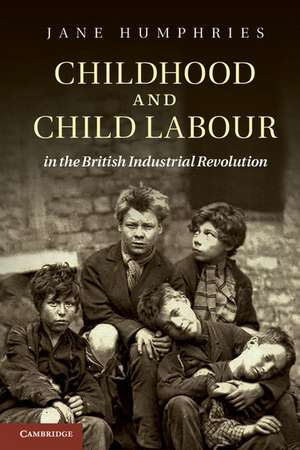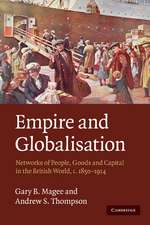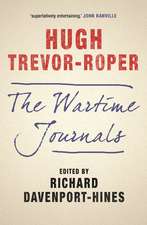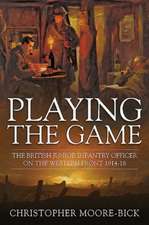Childhood and Child Labour in the British Industrial Revolution
Autor Jane Humphriesen Limba Engleză Paperback – 31 aug 2011
| Toate formatele și edițiile | Preț | Express |
|---|---|---|
| Paperback (1) | 240.68 lei 6-8 săpt. | |
| Cambridge University Press – 31 aug 2011 | 240.68 lei 6-8 săpt. | |
| Hardback (1) | 846.21 lei 6-8 săpt. | |
| Cambridge University Press – 23 iun 2010 | 846.21 lei 6-8 săpt. |
Preț: 240.68 lei
Nou
Puncte Express: 361
Preț estimativ în valută:
46.07€ • 48.01$ • 38.35£
46.07€ • 48.01$ • 38.35£
Carte tipărită la comandă
Livrare economică 06-20 ianuarie 25
Preluare comenzi: 021 569.72.76
Specificații
ISBN-13: 9780521248969
ISBN-10: 0521248965
Pagini: 454
Ilustrații: 7 b/w illus. 37 tables
Dimensiuni: 150 x 226 x 23 mm
Greutate: 0.68 kg
Editura: Cambridge University Press
Colecția Cambridge University Press
Locul publicării:Cambridge, United Kingdom
ISBN-10: 0521248965
Pagini: 454
Ilustrații: 7 b/w illus. 37 tables
Dimensiuni: 150 x 226 x 23 mm
Greutate: 0.68 kg
Editura: Cambridge University Press
Colecția Cambridge University Press
Locul publicării:Cambridge, United Kingdom
Cuprins
1. Introduction; 2. Sources, models, context; 3. Families; 4. Household economy; 5. Family relationships; 6. Wider kin; 7. Starting work; 8. Jobs; 9. Apprenticeship; 10. Schooling; 11. Conclusion; Bibliography.
Recenzii
Reviews of the hardback: 'This is a deeply humane book which breathes new life into the debate over the impact of industrialisation on the standard of living. It uses a range of qualitative and quantitative approaches to examine the evidence provided by more than 600 working-class autobiographies dating back to the 1600s. It will surely become essential reading for all scholars and students of modern economic and social history, as well as for all those interested in the history of childhood, the family and human well-being.' Bernard Harris, Professor of the History of Social Policy, University of Southampton
'Jane Humphries has cast considerable new light on many important questions about the economic, social, and demographic history of that era. We are provided with much new information on the nature and role of child labor, family relations, and education, among its many issues. This is an unusually well-done work of scholarship, based on the imaginative use of traditional sources to interpret long-standing topics in a most convincing manner.' Stanley Engerman, Professor of Economics and History, University of Rochester
'Jane Humphries' ingenious use of a remarkable assemblage of working class autobiographies brings new dimensions to this long-discussed subject by illuminating the contributions of children to the first Industrial Revolution. It is written with great empathy for the social and economic costs that these younger generations carried in facilitating this historical divide. It will be essential reading for economic, social, demographic and family historians and those whose interests focus on child labour in Third World countries.' Richard M. Smith, Professor of Historical Geography and Demography, University of Cambridge
'This is a work of economic history that is at once rigorous and humane. Jane Humphries' use of workers' autobiographies opens the black box of the household economy to reveal family relations and the circumstances that led young boys into the workplace. Humphries takes the reader from the highly particular to the reliably general with a rare and enviable mastery of both economics and history.' Jan de Vries, Professor of History and Economics, University of California, Berkeley
'These life stories treat us to colourful detail about what it was like to be a working child in industrialising Britain … [Humphries] has conveyed more about the nature and importance of children's employment than any previous study …' The Times Higher Education Supplement
'The industrial revolution brought immense prosperity to the British Empire … But as a new book by Jane Humphries, a professor of economic history, shows, a terrible price was paid for this success by the labourers who serviced the machines, pushed the coal carts and turned the wheels that drove the Industrial Revolution. Many of these labourers were children.' Daily Mail
'Britain's industrial revolution - the first in the world - would have never happened without child labour. That's the startling conclusion drawn by a leading economic historian following the most detailed analysis of relevant contemporary sources ever carried out.' BBC History Magazine
'There are too many strengths in this book to pack into a short review. The scale and impact of the Napoleonic Wars on ordinary families is fully appreciated. The situating of child labour within an Industrial Revolution that slowly gathers force through the eighteenth century is another one. … this monograph is a tremendous achievement.' Pamela Sharpe, Local Population Studies
'… eloquently written account … meticulous and brilliant research …' Journal of Economic Geography
'Children were increasingly at the heart of economic life in the acute age of industrialisation, and the historical community and the public alike owe Humphries a debt of gratitude for bringing this point into sharper focus.' The English Historical Review
'Childhood and Child Labour in the British Industrial Revolution is richly innovative in its marrying of economic data with life stories. The voices of the children - stoical, matter of fact, and moving in their ordinariness - jump off the page. There is no other historical study of British labour during the industrial revolution that so vividly brings to life the world of the working-class child.' History Workshop Journal
'Jane Humphries has cast considerable new light on many important questions about the economic, social, and demographic history of that era. We are provided with much new information on the nature and role of child labor, family relations, and education, among its many issues. This is an unusually well-done work of scholarship, based on the imaginative use of traditional sources to interpret long-standing topics in a most convincing manner.' Stanley Engerman, Professor of Economics and History, University of Rochester
'Jane Humphries' ingenious use of a remarkable assemblage of working class autobiographies brings new dimensions to this long-discussed subject by illuminating the contributions of children to the first Industrial Revolution. It is written with great empathy for the social and economic costs that these younger generations carried in facilitating this historical divide. It will be essential reading for economic, social, demographic and family historians and those whose interests focus on child labour in Third World countries.' Richard M. Smith, Professor of Historical Geography and Demography, University of Cambridge
'This is a work of economic history that is at once rigorous and humane. Jane Humphries' use of workers' autobiographies opens the black box of the household economy to reveal family relations and the circumstances that led young boys into the workplace. Humphries takes the reader from the highly particular to the reliably general with a rare and enviable mastery of both economics and history.' Jan de Vries, Professor of History and Economics, University of California, Berkeley
'These life stories treat us to colourful detail about what it was like to be a working child in industrialising Britain … [Humphries] has conveyed more about the nature and importance of children's employment than any previous study …' The Times Higher Education Supplement
'The industrial revolution brought immense prosperity to the British Empire … But as a new book by Jane Humphries, a professor of economic history, shows, a terrible price was paid for this success by the labourers who serviced the machines, pushed the coal carts and turned the wheels that drove the Industrial Revolution. Many of these labourers were children.' Daily Mail
'Britain's industrial revolution - the first in the world - would have never happened without child labour. That's the startling conclusion drawn by a leading economic historian following the most detailed analysis of relevant contemporary sources ever carried out.' BBC History Magazine
'There are too many strengths in this book to pack into a short review. The scale and impact of the Napoleonic Wars on ordinary families is fully appreciated. The situating of child labour within an Industrial Revolution that slowly gathers force through the eighteenth century is another one. … this monograph is a tremendous achievement.' Pamela Sharpe, Local Population Studies
'… eloquently written account … meticulous and brilliant research …' Journal of Economic Geography
'Children were increasingly at the heart of economic life in the acute age of industrialisation, and the historical community and the public alike owe Humphries a debt of gratitude for bringing this point into sharper focus.' The English Historical Review
'Childhood and Child Labour in the British Industrial Revolution is richly innovative in its marrying of economic data with life stories. The voices of the children - stoical, matter of fact, and moving in their ordinariness - jump off the page. There is no other historical study of British labour during the industrial revolution that so vividly brings to life the world of the working-class child.' History Workshop Journal
Notă biografică
Descriere
A unique 2010 account of childhood during the industrial revolution through the autobiographies of working men of the eighteenth and nineteenth centuries.















